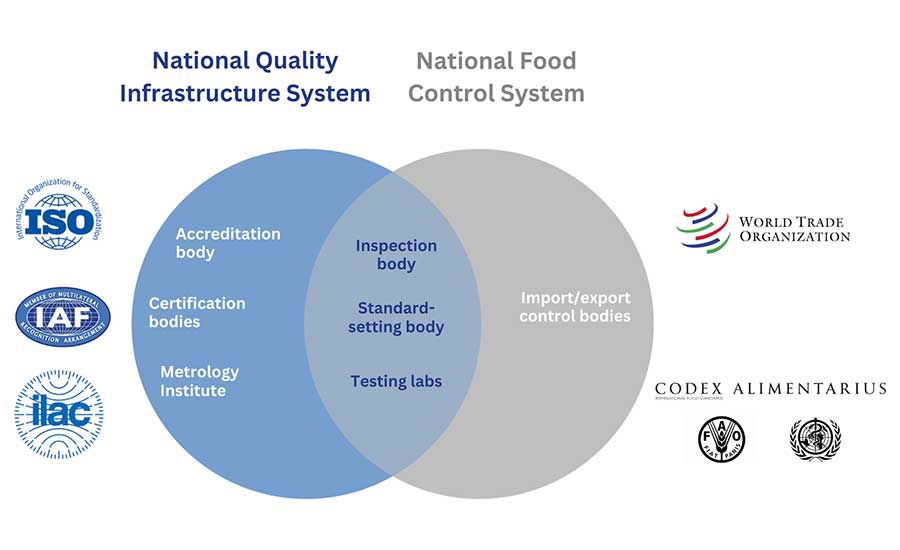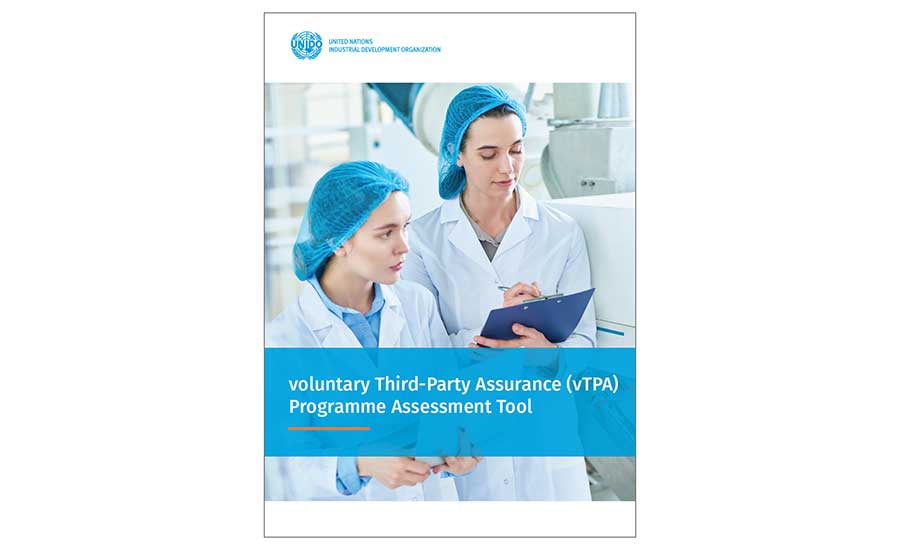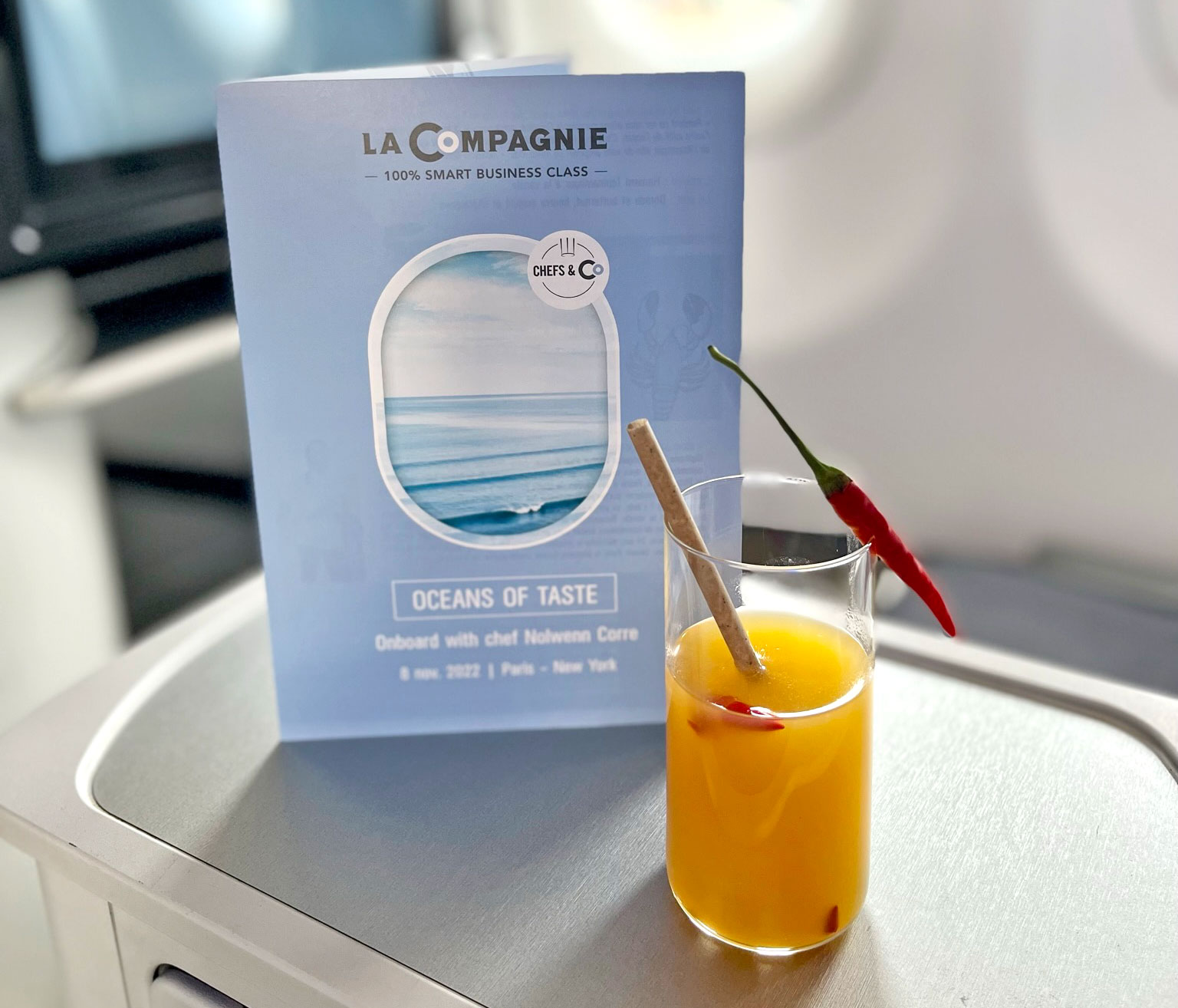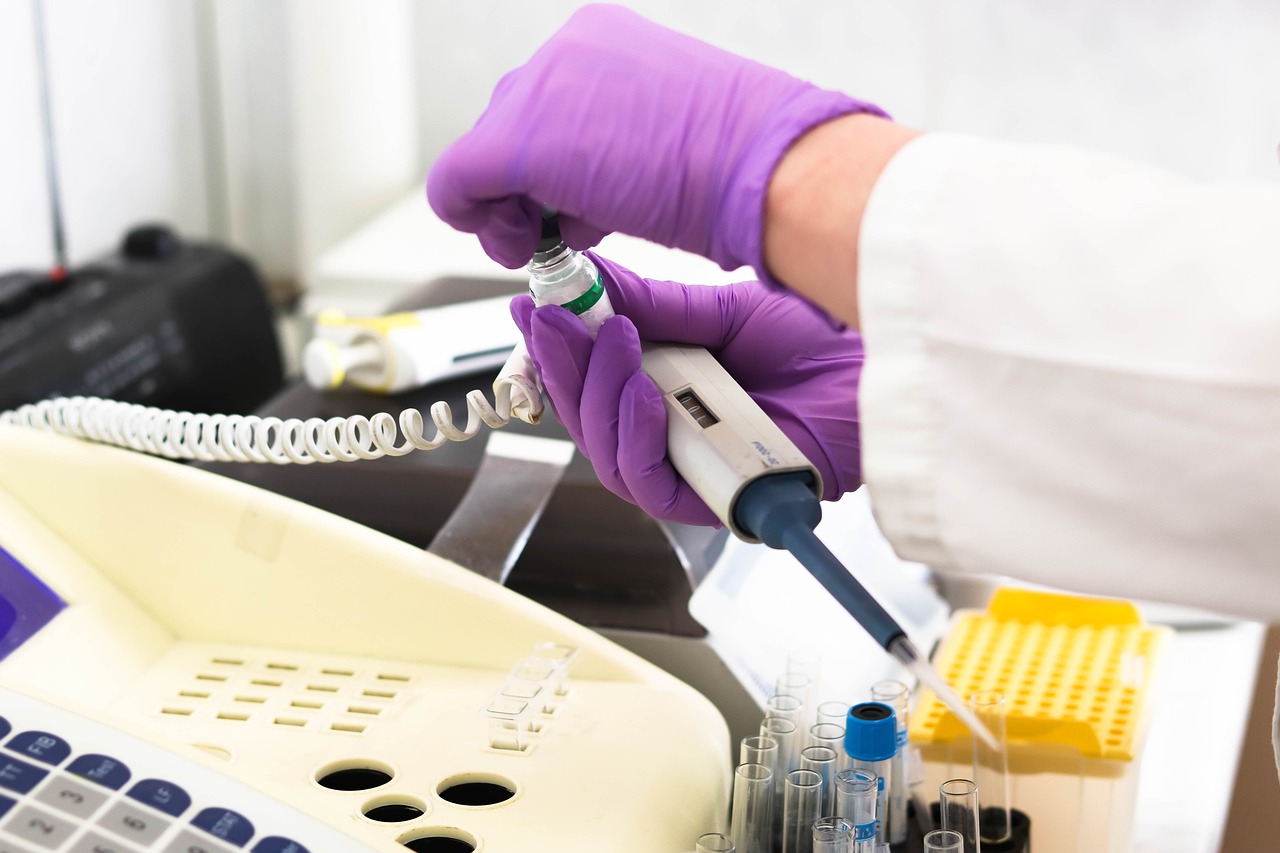[ad_1]
Meals security is a shared accountability among the many meals business, competent authorities, and customers. Business has the principle accountability to make sure that the meals it produces is secure, and competent authorities are in command of regulatory oversight of meals security management. The meals security panorama consists of quite a few different stakeholders, with every of them enjoying a vital position to supply secure and nutritious merchandise for human consumption.
The implementation of voluntary third-party assurance (vTPA) packages—generally known as personal meals security certification schemes, up to now—has been widespread within the meals business over the previous decade. One of many underlying the explanation why meals companies started implementing vTPA packages was to adapt with the upper necessities of patrons in home and worldwide markets. Over the previous 100 years, meals and feed manufacturing has elevated considerably because of an increase in international demand, however further public assets at an equal stage weren’t at all times essentially made obtainable to the authorities in command of regulatory enforcement. This, alongside the emergence of the fourth industrial revolution, in the end led to a scenario that known as for the event of recent regulatory methods. If no resource-efficient answer was discovered, many competent authorities can be unable to successfully fulfil their features as an oversight physique and in the end can be unable to ensure client safety.
To beat such challenges, EU Regulation 882/2004—Official Feed and Meals Controls was the primary authorized act that integrated using knowledge generated by vTPA for extra knowledgeable decision-making, thereby enabling regulators to develop and take a look at new data-driven approaches. Quick-forward to 2021, regulators adopted the Ideas and Pointers for the Evaluation and Use of Voluntarily Third-Social gathering Assurance Applications—CXG 93-2021 (referred to hereafter because the Codex steering) throughout the forty fourth Codex Alimentarius Fee assembly at Step 8.
The Codex steering integrates certification our bodies’ standards on conformity assessments and accreditation to strengthen the credibility and integrity of vTPA packages. Low- and middle-income nations steadily depend on overseas accreditation and certification providers, which not solely produces further prices for native meals companies but additionally leaves financial alternatives within the native service business untapped.
This text sheds gentle on some essential elements of profitable vTPA program implementation, significantly from an accreditation and certification service perspective. It discusses the position of accreditation and certification providers and the stipulations for efficiently implementing the vTPA strategy with the intention of supporting competent authorities on this course of. By highlighting these essential elements, regulators will probably be higher outfitted to reduce the dangers associated to the rollout of this new, data-driven strategy. Furthermore, the connection and overlap between the nationwide high quality infrastructure system and the nationwide meals management system—which was additionally thought of throughout the improvement of the Codex steering—are reviewed. This text shouldn’t be used as a standalone guideline; quite the opposite, it seeks to encourage events in additional exploring the potential of implementing the Codex steering.
UNIDO’s Function in Implementing the vTPA Method
UNIDO is at the moment concerned within the implementation of pilot initiatives for the Codex steering in West Africa and the Center East and North Africa. The initiative is funded by the Requirements and Commerce Improvement Facility (STDF) hosted by the World Commerce Group (WTO), and can contribute to the identification of sure stipulations and advantages.
UNIDO’s mandate is anchored in Sustainable Improvement Purpose 9: “Construct resilient infrastructure, promote inclusive and sustainable industrialization, and promote innovation.” As the most important multilateral participant in high quality infrastructure improvement, UNIDO has over 40 years of expertise supporting its Member States and different companion organizations via focused interventions. To additional strengthen the essential linkages between high quality infrastructure and meals security, UNIDO developed the Meals Security Approach1 in 2016, which promoted a positive meals security atmosphere via the creation of a collaborative inter-agency atmosphere to assist meals security regulatory frameworks and tailor-made meals safety-related conformity evaluation providers to reinforce meals security compliance.
The totally different constructing blocks or intervention areas of UNIDO’s strategy even have sturdy linkages with the Codex steering on vTPA by aiding within the improvement of tailor-made and scalable meals security schemes and by enhancing native meals security competences of practitioners concerned in meals security certification providers.
Amongst different interconnected areas of experience, UNIDO supplies steering to its Member States on digital transformation and innovation for profitable industrial modernization of high quality infrastructure methods, together with improved decision-making by policy-makers. By means of its normative position, UNIDO goals to catalyze its impact as a way to upscale ISID influence and affect sustainable improvement agendas. Accordingly, UNIDO supplies technical steering to its Member States on the vTPA strategy and implements capacity-building initiatives.
Relationship Between the Nationwide High quality Infrastructure System and the Nationwide Meals Management System
Meals management and high quality infrastructure methods are key elements of nationwide and regional economies with out which sustainable industrial improvement wouldn’t be potential. The standard infrastructure system consists of “organizations (private and non-private) along with the insurance policies, related authorized and regulatory framework, and practices wanted to assist and improve the standard, security, and environmental soundness of products, providers, and processes.”2 The nationwide meals management system, as outlined by the Meals and Agriculture Group of the United Nations (FAO), ensures that the meals provide within the nation is secure, nutritious, and fit to be eaten, and that meals security and high quality necessities are being met and are precisely labeled in accordance with the regulation. Each methods present providers or features which can be important for the correct functioning of the meals management system; a few of these providers, reminiscent of testing, certification, and inspection, are supplied by each methods, whereas others are delivered by both one of many methods (Determine 1).

Relevance of Internationally Acknowledged Conformity Evaluation Providers
It should be fastidiously thought of by middle- and lower-middle economies if they should set up native accreditation and certification providers to implement the vTPA strategy. The Codex steering doesn’t encourage the institution of such providers; nonetheless, their availability may play an enabling position for the profitable rollout in these nations. It would suffice for sure conformity evaluation providers, for instance metrology or accreditation providers, to be obtainable on the regional stage, relying on the scale and financial system of partnering nations. Regardless, accreditation and certification providers are an integral part of any financial system because of their overarching position in each the private and non-private sector, from meals to heavy business to providers.
For accreditation providers to be internationally acknowledged, the given accreditation physique should be a signatory to the Worldwide Accreditation Discussion board’s (IAF’s) Multilateral Recognition Association (MLA). Nationwide accreditation our bodies steadily belong to a regional grouping, which reduces prices linked to see evaluate processes. These regional groupings should, nonetheless, be a part of the IAF’s MLA construction.
By way of the scope of accreditation, the vTPA strategy primarily focuses on the certification of administration methods and merchandise. Most significantly, an accreditation physique that may be a signatory to the MLA should adhere to the next requirements:
ISO/IEC 17021:2015 (Conformity evaluation—Necessities for our bodies offering audits and certifications of administration methods)
ISO/IEC 2) 17065:2012 (Conformity evaluation—Necessities for our bodies certifying merchandise, processes, and providers)
ISO/IEC 17067: 2013 (Conformity evaluation—Fundamentals of product certification and tips for product certification schemes)
ISO 22000:2018 on Meals Security Administration Programs.
Likewise, entry to dependable certification providers are important for meals companies to cut back prices and to learn from technical steering of their native language. To enhance knowledge reliability, these providers must be delivered by ISO 17021 and/or ISO 17065 accredited certification our bodies. That is typically a prerequisite for many internationally benchmarked certification schemes to turn out to be a companion. Native certification our bodies might have entry to extra knowledge and knowledge that’s extra dependable on the meals business’s stage of improvement and potential areas of non-compliance, which may additionally enhance the integrity of information.
To create entry to better-quality and cost-effective providers, a number of certification our bodies should compete in opposition to one another in the identical market. Some meals enterprise operators (FBOs) would possibly favor to go for a certification physique with a extra lenient implementation follow, which must be flagged by the competent authorities. As a bonus for native certification providers, native regulators can have a greater understanding of the practices and capacities of those native our bodies and if there’s any insurance coverage when it comes to knowledge integrity.
The Codex guideline emphasizes potential partnerships between the competent authorities and vTPA scheme homeowners to facilitate info sharing with the consent of FBOs. The conclusion of a partnership settlement between the competent authority and the accreditation physique is perhaps obligatory in some nations to find out which certification physique may not be following the related worldwide requirements. This might additionally function a verification mechanism for knowledge gained from vTPA packages.
A competency framework and code of conduct for meals security practitioners concerned in high quality assurance may additional improve knowledge integrity, whereas audits or compliance monitoring may deter numerous kinds of misconduct.
Conditions for Extra Knowledgeable Resolution-Making Based mostly on Information Gained from vTPA Applications
The Codex steering (CXG 93-2021) has created a brand new alternative for competent authorities to make extra knowledgeable selections primarily based on knowledge gained from vTPA packages. It additionally supplies for an evaluation to consolidate the credibility and integrity of vTPA packages, thereby making certain knowledge high quality. However, the competent authorities should be certain that sure stipulations are met earlier than the Codex steering on vTPA packages could be rolled out. These stipulations could be grouped into six totally different areas:
Existence of purposeful entities throughout the (nationwide and/or regional) high quality infrastructure and nationwide meals management methods.
The institution of an operational digitalized performance-monitoring framework for the competent authorities in command of inspection and regulatory enforcement. The Codex’s Ideas and Pointers for Monitoring the Efficiency of Nationwide Meals Management Programs (CXG 91-2017) supplies a common framework and a conceptual, step-wise strategy for competent authorities to create the preliminary constructing blocks of such a system. For the deployment of the vTPA strategy, efficiency indicators for the inspection providers must be established and adequately examined to facilitate the measurement of a baseline state of affairs for potential comparisons. The monitoring system ought to run on a safe digital platform the place knowledge are ideally entered digitally.
The personal sector makes use of the vTPA packages and/or demand entry to certification providers to satisfy with regulatory and purchaser necessities.
The institution of a competency framework for inspectors, in addition to compliance and enforcement insurance policies, consists of important coverage paperwork for improved knowledge high quality and integrity. Equally, a competency framework for auditors and vTPA practitioners (consultants and trainers) also can deal with extra standardized audit outcomes.
Threat-based inspection on the FBO stage ought to assist the prioritization of visits introduced inside a monitoring framework.
The inner group construction must be adjusted to higher inform decision-making mechanisms to allow knowledge cleansing, analyses, and analysis of their integrity. The competent authorities ought to ideally have a separate unit that’s in command of these actions with the flexibility to equip regulators with extra sturdy and up-to-date info.
Nations, significantly people who would not have a longtime risk-based monitoring and inspection system, might must prioritize creating such a system. Though the vTPA strategy may help authorities shut sure regulatory oversight gaps and construct a greater danger profile of various sectors than earlier than, they might want to have the capability to confirm info acquired from third events, and to have the capability to reply swiftly to any modifications in compliance developments.
Existence of native vTPAs with sturdy private-sector inclusion would possibly facilitate potential data-sharing; nonetheless, their integrity and impartiality should be rigorously examined by the competent authorities throughout their recognition course of.
Conclusion
To make sure long-term sustainability, authorities authorities should meet further stipulations on the macro stage, reminiscent of instructional packages on meals security and knowledge science, extra complete knowledge coverage for the competent authorities, and the required laws on privateness and knowledge sharing. The scope of this text doesn’t embrace such macro-level enablers, however they’re basic for the implementation of public endeavors in digitalization for improved decision-making.

Though the Codex steering doesn’t encourage the institution of native, internationally acknowledged accreditation and certification providers, such providers may play an instrumental position within the profitable utility of the vTPA strategy on the native and regional stage.
Since accreditation and certification providers, in addition to official regulatory oversight, exist in different industries (e.g., the aviation, mining, and well being industries), the vTPA strategy may have spillovers into different industries. For this to occur, entry to internationally acknowledged, native accreditation and certification providers stays important.
UNIDO has been growing a toolkit for regulators to facilitate the correct uptake of the vTPA strategy. UNIDO launched the vTPA evaluation instrument (Determine 2) throughout the Inaugural Assembly of the Africa Meals Regulatory Authorities Discussion board (AFRAF) on October 12, 2023, in Cairo, Egypt.
References
1 United Nations Industrial Improvement Group (UNIDO). Meals Security Method: Safer Meals for Sustainable and Resilient Companies. December 2021. https://www.unido.org/websites/default/recordsdata/recordsdata/2021-12/Foodpercent20Safetypercent20Approach.pdf.
UNIDO. High quality Infrastructure: UNIDO’s Distinctive Method. August 2018. https://www.unido.org/websites/default/recordsdata/recordsdata/2018-08/UNIDO_QI_CASE_FINAL_ONLINE_2.pdf.
Gabor Molnar, Ph.D., is an Industrial Improvement Professional on the United Nations Industrial Improvement Group’s (UNIDO’s) Meals Safety and Meals Programs Unit, implementing meals security initiatives in Africa and Asia. Dr. Molnar additionally represents UNIDO in quite a few worldwide platforms. He acquired his Ph.D. in Meals Science from Université Laval in Quebec Metropolis, Canada.
[ad_2]
Source link




















